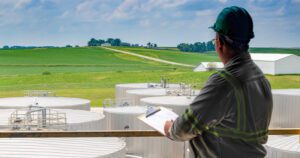The U.S. rail industry has historically been the most efficient way to move freight over land. One train can transport a ton of freight more than 480 miles on a single gallon of fuel. To do so, 3.1 billion gallons of diesel fuel are used every year, making up 95% of the rail industry’s greenhouse gas emissions. Increasing external pressures are now forcing fleets to look at ways to decarbonize, and do it in a timely manner to address climate change. Customers and companies are demanding change, and policy often dictates the timeline. All seven Class I railroads, companies such as Union Pacific and BNSF, now have climate commitments to reach net-zero emissions by 2050. The only way to help achieve these goals today is by using more biodiesel and renewable diesel. These clean fuels are the lowest cost, drop-in solution for carbon reduction efforts. Especially when considering the 50-year lifespan of a train, other alternative fuel technologies are decades away from replacing the 23,000 diesel-electric locomotives in Class I service across North America.
The same can be said at sea. The shipping industry is responsible for three percent of carbon emissions worldwide, burning 300 million tons of fuel every year. Maersk has an ambitious goal of becoming carbon-neutral by 2040 with more shipping companies following suit. Turning to low carbon, liquid biofuels is the obvious choice to make an immediate change. No capital investments are needed in engines nor the fueling infrastructure, and companies don’t have to wait for future technologies to come to fruition to be able to reduce emissions today.
Nebraska is no stranger to answering the call to decarbonize. The Nebraska Soybean Board was instrumental in developing the Bioheat® Fuel market in the Northeast and Mid-Atlantic. Providing funds for testing led to the approval of Bioheat® Fuel as a home-heating fuel, tapping into a 4-billion-gallon industry. More than 70% of New York City government buildings now use 10% biodiesel for heating oil, while the city’s fire trucks, garbage trucks and other fleets run on B20.
The growing demand for liquid biofuels creates more demand for feedstocks, which creates even more opportunities for our nation’s soybean farmers. Nebraska continues to invest in biodiesel and renewable diesel production with two new soybean crush facilities planned for the state, representing investments of $725 million. Overall, the clean fuels market supported an estimated worth of $322 million of the overall value of Nebraska’s soybeans in 2022. For a farmer with 500 acres in Nebraska, the biodiesel and renewable diesel market supported around $28,400 for their bottom line in 2022. Soybean farmers are helping make net-zero a reality, and the benefits of investing in the industry keep growing.
ABOUT CLEAN FUELS ALLIANCE AMERICA
Made from an increasingly diverse mix of resources such as recycled cooking oil, soybean oil, and animal fats, the clean fuels industry is a proven, integral part of America’s clean energy future. Clean Fuels Alliance America is the U.S. trade association representing the entire biodiesel, renewable diesel and sustainable aviation fuel supply chain, including producers, feedstock suppliers and fuel distributors. Clean Fuels receives funding from a broad mix of private companies and associations, including the United Soybean Board and state checkoff organizations.




